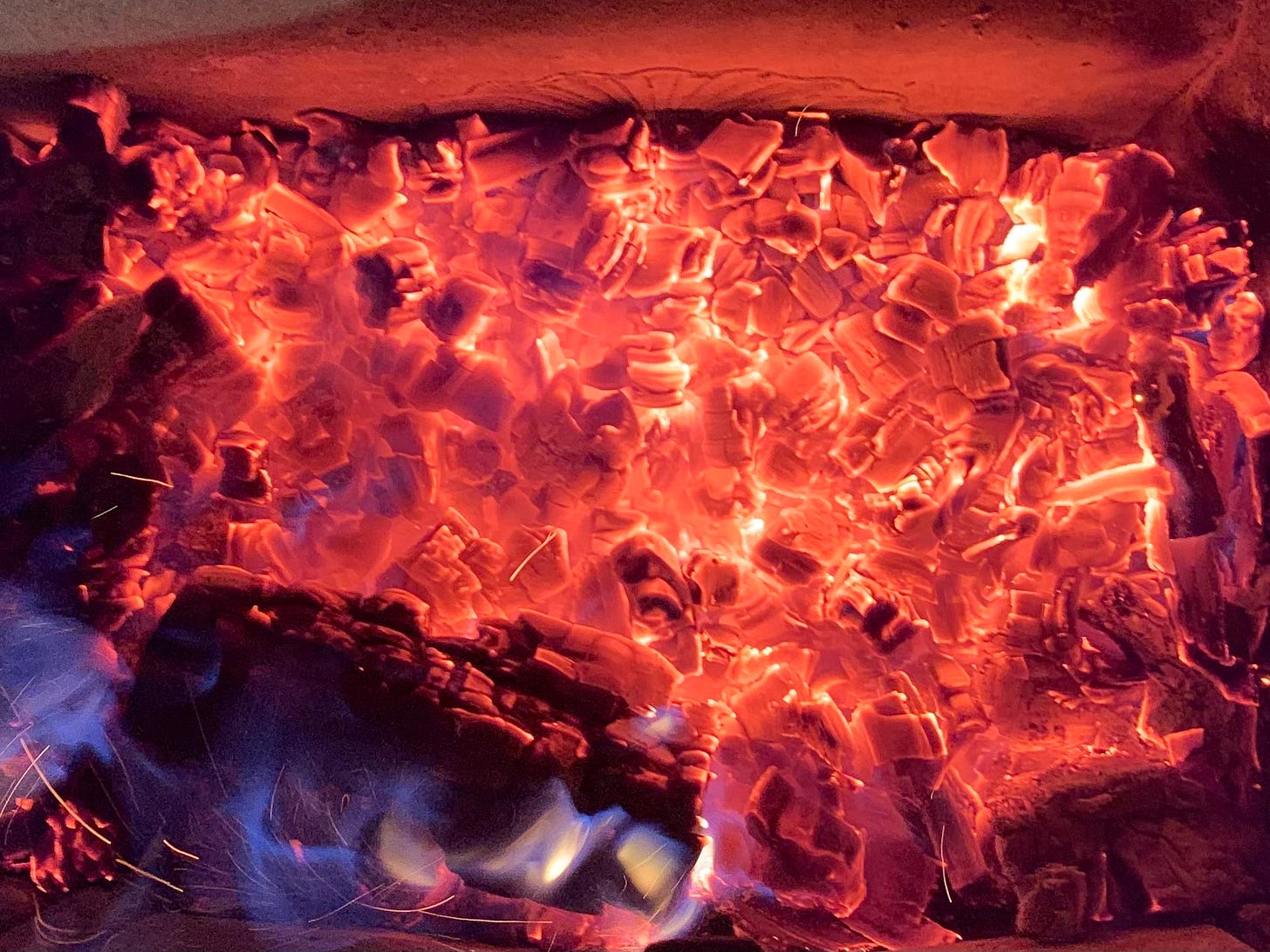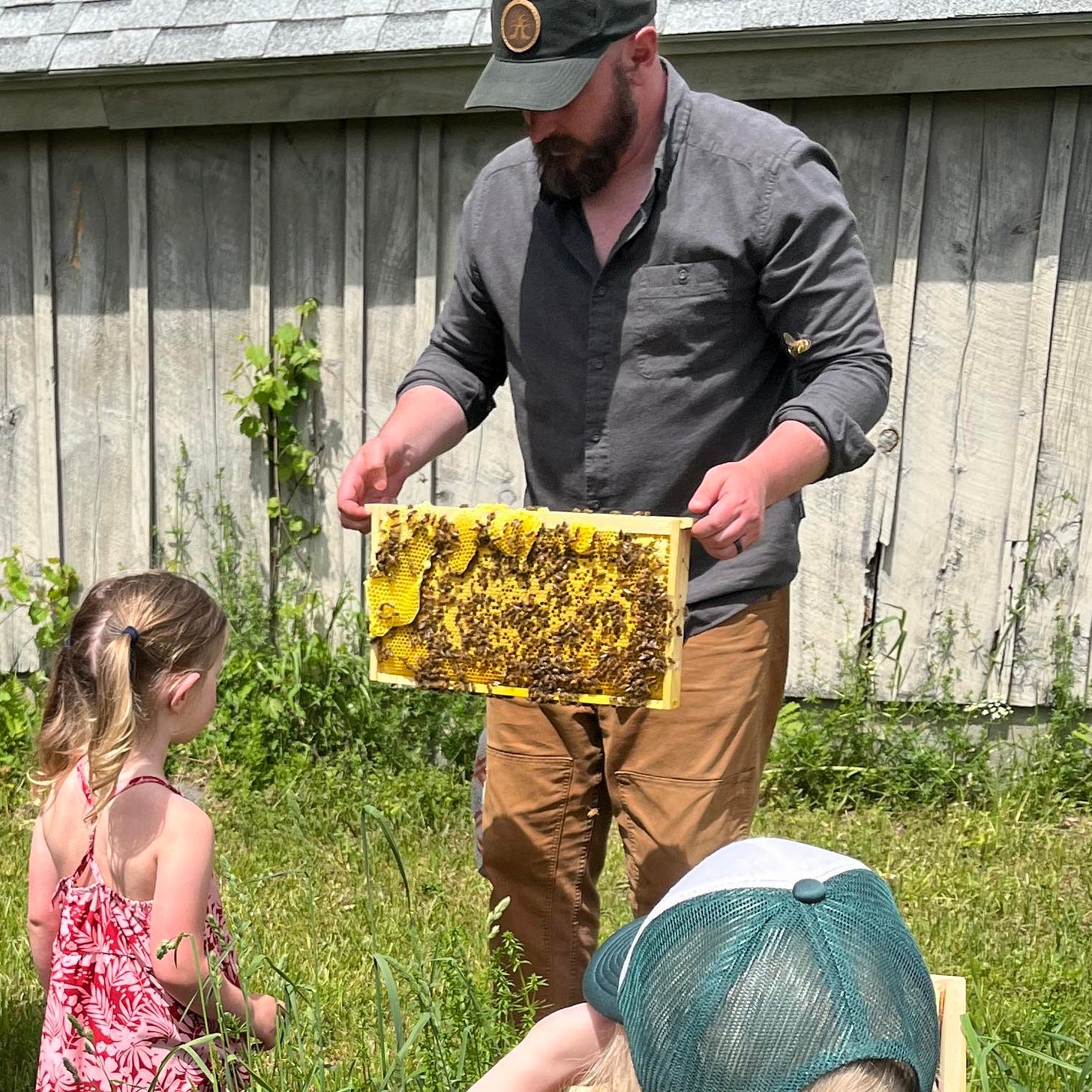Winter Does Not Care about your Feelings
A cruel, cold, comforting accountability in January
I am running out of firewood. It is not an emergency. It is not really even a problem; we can always heat with the oil furnace. We enjoy heating with wood though, and it allows us to cook, melt snow into pure water, and heat our home in the event of a long term power outage. We always keep a good supply on hand. Nevertheless, this year was busy and I did not begin cutting wood in earnest until late June. As I throw what remains through my cellar door to the basement, I tell myself I was busy preparing for the arrival of our new baby. As I stack the thrown pieces, I whine internally about how long it took to build the chicken coop in the spring when I could have been felling trees. As I putter around the yard looking nervously at the dwindling pile, I tell myself “at least we started our apiary in May.” The truth remains though, that I simply did not cut enough firewood. I can spin whatever comforting stories and half-truths I want to assure myself I had good reasons to not cut as much wood as I did. I am a good storyteller, even to myself, but ultimately the hard truth is that the nights are cold and the wood pile is low. As I shut the cellar door, I reflect on how we see people flocking to the natural world these days in spite—or perhaps because—of its harsh truths. The modern world allows us to avoid so much consequence, to be so unaccountable to what truly matters. To dodge justice. Meanwhile, we are inordinately punished, sanctioned, and silenced for small, intangible trespasses that have no real earthly effect. The natural world offers a refuge from this strange inverse: a proportional, inexorable, and unyielding consequence for all things. Despite how grim and dire this sounds, make no mistake: we hunger for it. We need it now more than ever.
The modern world is full of invented consequences, intangible penalties that feel arbitrary and unmoored from the fabric of real life. Consider the anxiety we experience over missed texts, poorly worded emails, or social faux pas—things that carry no genuine, lasting impact but can haunt us for days and make us cringe with embarrassment as we recall them years down the line. An errant post might cost someone their job, a poorly timed reply might damage a relationship, and a perceived slight could spark a feud. I recently overhead someone offhandedly suggest that perhaps admitting students to preschool only if they were potty trained could lift the burden of the overworked teachers there. This man was immediately decried by his peers for being insensitive to students with disabilities and accusations of heartless ableism were hurled. You could watch this person become a pariah in real time. Consequences like these are not born out of survival or necessity; they are penalties enforced by invisible rules and shifting social norms. They feel hollow, weightless, and unjust because they lack any connection to the natural order. In contrast, the natural world is mercifully indifferent. The cold does not care why you didn’t split and stack enough firewood. The frost does not hold off because you were too busy with other tasks. Its consequences are not personal; they simply are. Yet in their cold inevitability, there is a kind of fairness. You know where you stand with the natural world. Its demands may be merciless and its consequences grim, but they are honest, and we are starved for that honesty in our increasingly artificial world.
It’s no wonder, then, that so many people are returning to the natural world, seeking solace in its brutal simplicity. Gardening, homesteading, foraging, hunting and simply hiking have surged in popularity, even among those who once had little connection to such pursuits. Look at data for visitations to national parks for instance. At the end of 2019, they surged as a reaction to the pandemic and then did not stop. You would think with the end of lockdowns and advent of the vaccine that people would have returned to their pre-pandemic indoor lives but no. They stayed in the parks, the forests, the fields. These tie us to a world that is both real and immediate, a world where effort yields tangible results. The pumpkin swollen in your garden is proof of your labor, the warmth of a fire is evidence of your preparation, the little dam your child builds in the brook changes the world. Compare this to modern labor, where entire weeks can disappear into emails and spreadsheets, producing nothing you can hold in your hands. The natural world offers not just a reprieve from this abstraction but a reminder of what it means to live with purpose, within a body. You plant a seed, tend to it, and reap its harvest. You get a box of tiny chicks at Easter, raise them all summer, and by September each of them lay for you a daily egg. The chain of cause and effect is clear, and the reward is both physical and deeply satisfying. This is why so many find peace in the garden, park, or forest. These spaces do not demand perfection, nor do they punish mistakes beyond what is fair.
But the natural world does more than just reward effort; it imposes clarity and offers proportionality. It strips away pretense and forces us to confront our failings. When I look at my dwindling woodpile, I cannot blame anyone else for my predicament and the result is an expensive heating oil bill or cold nights. This year, if I tend it carefully, I will be rewarded with warmth. The modern world, with its endless justifications and blame-shifting, rarely allows for such self-reckoning or earnest cause and effect. Our failures are often cloaked in ambiguity, and our successes are too easily attributed to luck or, God forbid, privilege. Minor infractions are met with outsized punishment, while catastrophic failures often go unnoticed or uncorrected. A typo in an email might lose you your job, but a lifetime career of wasting resources or neglecting the environment goes unchecked. Do you earnestly believe anyone will actually be held accountable for allowing huge swaths of Los Angeles to burn or for forgetting the flood victims of North Carolina as they freeze? No. All any public official has to fear from these catastrophes is an embarrassing press conference and unheeded calls to resign. In the natural world, there is no hiding from your failures. This is good. If an early frost kills your fledgling crops, it is because you were overly eager and planted too soon. If your bees starve, it is because you failed to notice the dearth of wildflowers in July and feed them sugar water. If you do not dress well for your hike, you will need to turn back or worse. There is an honesty in this accountability, a chance to see ourselves clearly, stripped of the plastic affectations of modern life. It is humbling, but it is also empowering. In the modern world, this balance is absent. The lack of proportionate natural consequences leaves us feeling disoriented and powerless. We hunger for a return to a world where effort and consequence align, where our actions have weight and meaning. This is why the natural world continues to draw us back as injustice grows. Its demands are steep, but they are fair and they are known.
So, as I shut the cellar door and glance at the shrinking woodpile, I remind myself that this is what I wanted. Not the cold nights or the extra work, but the clarity, the honesty, and the connection that only the natural world can provide. When the snow melts in March, I will gather my tools and head back into the woods, not just to ensure my family stays warm, but to remind myself of what is real. We are not made to live in a neon world of false consequences, punitive pixels, and intangible rewards. We are real and we crave the laws of the green and white places. We know it marrow-deep that we are not living well and we are blood-hungry for that sense of good order we remember, that we know we can still find out there amid the loam and the bower.







We all only have so much time and energy, so we must prioritize meeting the very real demands of nature, over the imagined demands of society.